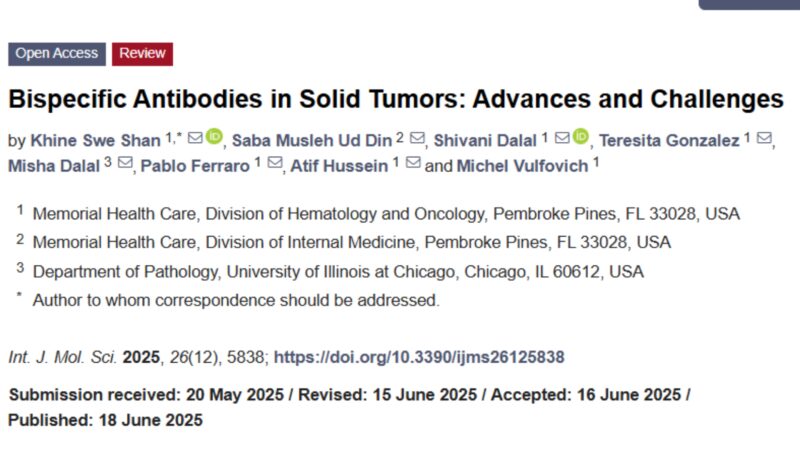Hung Trinh, Senior VP of Operations at Seneca Therapeutics, shared a post on LinkedIn:
“Bispecific Antibodies in Solid Tumors: Advances and Challenges
Bispecific antibodies (BsAbs) have shown potential in cancer treatment and have become a rapidly growing field in cancer immunotherapy. Unlike monoclonal antibodies with two identical binding sites, BsAbs simultaneously bind two distinct epitopes on the same or different antigens, allowing for a range of mechanisms of action, including engaging immune cells to kill cancer cells and blocking signaling pathways. Despite regulatory approvals for hematological malignancies in the last decade, their clinical success in solid malignancies has been lacking until recently.
There are currently five BsAbs approved by the FDA in the United States for solid tumors—amivantamab, tarlatamab, tebentafusp, zanidatamab and zenocutuzumab—and two BsAbs approved in China—cadonilimab and ivonescimab. Currently, several BsAbs are under clinical development for solid tumors, but are mostly in early phase I and II trials. This review provides an overview of the basic mechanism of action of BsAbs, current FDA-approved BsAbs, and current BsAbs under clinical development, their challenges in clinical use, the management of toxicities, and future directions.
Bispecific antibodies (BsAbs) have shown potential in cancer treatment and have become a rapidly growing field in cancer immunotherapy. Unlike monoclonal antibodies with two identical binding sites, BsAbs simultaneously bind two distinct epitopes on the same or different antigens, allowing for a range of mechanisms of action, including engaging immune cells to kill cancer cells and blocking signaling pathways. Despite regulatory approvals for hematological malignancies in the last decade, their clinical success in solid malignancies has been lacking until recently.
There are currently five BsAbs approved by the FDA in the United States for solid tumors—amivantamab, tarlatamab, tebentafusp, zanidatamab and zenocutuzumab—and two BsAbs approved in China—cadonilimab and ivonescimab. Currently, several BsAbs are under clinical development for solid tumors, but are mostly in early phase I and II trials. This review provides an overview of the basic mechanism of action of BsAbs, current FDA-approved BsAbs, and current BsAbs under clinical development, their challenges in clinical use, the management of toxicities, and future directions.”
Title: Bispecific Antibodies in Solid Tumors: Advances and Challenges
Authors: Khine Swe Shan, Saba Musleh Ud Din, Shivani Dalal, Teresita Gonzalez, Misha Dalal, Pablo Ferraro, Atif Hussein, Michel Vulfovich
Read the Full Article.

More posts featuring Hung Trinh.


